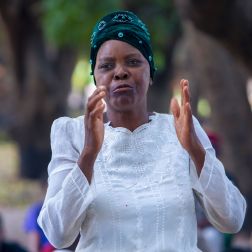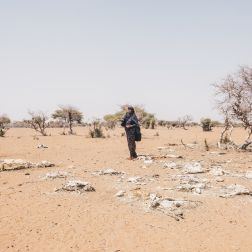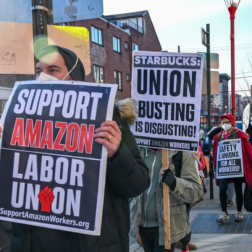- 5 mins read time
- Published: 21st November 2019
Bangladesh: Transformative tailoring for Rohingya women

Gender dynamics in the largest refugee settlement in the world
“You have come to this country as a guest,” Shompa, 60 years old, says to Caroline Leal from Oxfam as she sits in Shompa’s shelter in Camp 22 in the Unchiprang camp in the Cox’s Bazar district of Bangladesh. “Well, so have I. And, just like you, I want to return home.”
It’s been two years since over 700,000 Rohingya, a stateless Muslim minority in Myanmar, fled their home to Bangladesh. Their exodus to seek safety began on August 25, 2017 after violence broke out in Myanmar’s Rakhine State.
Bangladesh is now the host of the largest refugee settlement in the world. More than half the Rohingya refugees are women, and 60 percent of the female population are under 18 years of age.
Although Shompa is safe from the violence she was subjected to in Myanmar, she and thousands of Rohingya women still continue to face huge challenges in the refugee settlements. Gender dynamics, trauma endured in Myanmar and pre-existing cultural and social norms are proving to be major factors for women to overcome.
“When fleeing our home, it was too dangerous to grab any belongings. We had no choice but to escape to Bangladesh with only the clothes on our back,” Shompa said.
This is particularly problematic for Rohingya women in the camp as the community’s traditional practice of purdah, which is the screening of women from men or strangers, is still observed. The lack of proper clothing has greatly affected the ability of Rohingya refugee women to move freely around the camps.
Back in Rakhine, women did not need a burqa to access latrines and water points, as these were close to their homes and they lived with their relatives. But the reality in Camp 22 is different.
“When I needed to go outdoors, I had to see if there were any men around,” Shompa said. “Because of this [lack of proper clothing], I often couldn’t go outside.”
Working directly with Rohingya women and members of the host community in the district of Cox’s Bazar, Oxfam decided to help address this challenge. Through Oxfam’s protection and sustainable livelihoods program, a project was designed which involves the distribution of nine different fabrics along with tailoring vouchers. These vouchers can be used at local shops in the host community, and mean that Rohingya women are able to have garments that are culturally appropriate.
A common thread

A short drive away from Camp 22, the small town of Chakmaara is filled with shops and tuk-tuks. On the second floor of the plaza, Noor Mohammed, a local tailor, fills out orders inside his brightly painted shop. Fabric, buttons and thread fill every corner.
“On my own, I couldn’t complete all of the orders! I had six tailors working but had to hire five more,” Mohammed said.
Mohammed is one of the local vendors participating in Oxfam’s tailoring voucher program.
The impact of the Rohingya refugee camps on a host community that is already one of the poorest in Bangladesh is undeniable.
“Since the construction of the camps, the cost of daily life and goods has risen significantly,” says Mohammed. “One kilogram of potatoes usually cost six Taka (approximately $0.10 CAD). Today, it’s around 22 Taka.”
Cost increases are also affecting businesses. Before the influx, business owners like Mohammed averaged a monthly profit of 5000 Taka (approximately $77 CAD). That average has been cut by more than half, hovering around 2000 Taka.
Since the launch of the tailoring voucher program, Mohammed’s business has prospered. In the past three months alone, he and his team have made 1,400 garments.
“Thanks to this program, my business has greatly flourished,” he says.

A humanitarian response working for women
A couple of shelters down from Shompa’s, Ayesha, 18, lives after fleeing the violence of Myanmar with her husband, their young son, and her parents. Her husband lives 50 kilometres away in the Balukhali camp, working at the mosque.
Life is difficult for a single woman in the camp. Ayesha collects firewood and heavy buckets of water from a nearby water point twice daily. She has participated in Oxfam’s tailoring voucher program
“For me, it’s a matter of safety,” she says. “I feel heard.”
Ayesha isn’t alone in her sentiment. According to a recent survey done on the Rohingya response by Oxfam, 95 percent of women feel safer and more comfortable going outside their home thanks to the tailoring voucher program.
Designing programs for women, with women, is putting power back in their hands in times of crisis. Listening to what Shompa and Ayesha want is the way to ensure humanitarian responses work for women.

Ring the alarm
Oxfam’s tailoring program is helping women like Shompa and Ayesha, but it won’t fix the problems that forced them to flee to Bangladesh in the first place.
The ongoing violence and persecution against Rohingya people in their home country, Myanmar, must be stopped. Two years after the crisis made international headlines, Rohingya people in Myanmar still don’t have basic rights - including freedom of movement, access to citizenship, healthcare and education. Ultimately the Rohingya people need an end to their persecution. They need durable solutions. They need a future, now.
This is why, alongside the humanitarian assistance Oxfam is providing on the ground, Oxfam is calling on Myanmar authorities to end the violence and ensure that Rohingya people in Myanmar can enjoy their rights.
Because, ultimately, what is it that Shompa wants?
“Justice,” she declares. “All I want is to go back home with recognition and justice.”




